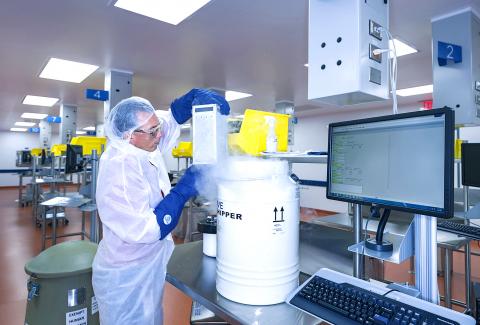Novartis AG’s pioneering new cancer drug on Wednesday won enthusiastic support from a US federal advisory panel, paving the way for approval of the first US gene therapy.
The panel unanimously recommended that the US Food and Drug Administration (FDA) approve the drug — tisagenlecleucel — for patients ages three to 25 with relapsed B-cell acute lymphoblastic leukemia (ALL), the most common form of US childhood cancer.
The drug uses a new technology known as CAR-T, or chimeric antigen receptor T-cell therapy, which harnesses the body’s own immune cells to recognize and attack malignant cells.

Photo: AP
In a clinical trial, 83 percent of patients who had relapsed or failed chemotherapy achieved complete or partial remission three months post infusion. After one year 79 percent of patients were still alive.
Patients with ALL who fail chemotherapy typically have only a 16 percent to 30 percent chance of survival.
“This is a potentially paradigm-changing type of benefit,” said Brian Rini, one of the panelists and a physician at Cleveland Clinic Taussig Cancer Institute.
The FDA is not obliged to follow the recommendations of its advisers, but typically does so. The agency is expected to rule on the drug by the end of September.
Approval of tisagenlecleucel would have implications not only for Novartis, but for companies developing similar treatments, including Kite Pharma Inc, Juno Therapeutics Inc and bluebird bio Inc.
It would also advance a technique scientists have been attempting to perfect for decades and help lift the entire field of cell therapy.
“This will be a historic approval,” said Brad Loncar, chief executive of Loncar Investments, which runs the Loncar Cancer Immunotherapy ETF. “As an investor I’ve never seen anything like it. It’s an entirely new way of treating cancer.”
The product is made by extracting and isolating a patient’s T cells, genetically engineering them to recognize and target cancer cells, and then infusing them back into the patient.
Novartis said the entire process would take 22 days by the time it is launched.
The treatments are given just once and are expected to cost up to US$500,000.
Loncar said approval of tisagenlecleucel would represent an inflection point for investors.
“Any time a new technology crosses the finish line at the FDA, it gets noticed and I think you’ll see a rush of investment and see these therapies be improved over time,” Loncar said.
More than half of patients experienced a serious complication known as cytokine release syndrome, which occurs when the body’s immune system goes into overdrive. Doctors were able to manage the condition and the syndrome caused no deaths.
The FDA expressed concern that the drug could cause new malignancies over the long term.
Panelists generally felt that risk was low and they said Novartis’ risk mitigation proposals were adequate.
Novartis is also testing the drug in diffuse large B-cell Lymphoma, the most common form of non-Hodgkin lymphoma, as is Kite.

The Eurovision Song Contest has seen a surge in punter interest at the bookmakers, becoming a major betting event, experts said ahead of last night’s giant glamfest in Basel. “Eurovision has quietly become one of the biggest betting events of the year,” said Tomi Huttunen, senior manager of the Online Computer Finland (OCS) betting and casino platform. Betting sites have long been used to gauge which way voters might be leaning ahead of the world’s biggest televised live music event. However, bookmakers highlight a huge increase in engagement in recent years — and this year in particular. “We’ve already passed 2023’s total activity and

Nvidia Corp CEO Jensen Huang (黃仁勳) today announced that his company has selected "Beitou Shilin" in Taipei for its new Taiwan office, called Nvidia Constellation, putting an end to months of speculation. Industry sources have said that the tech giant has been eyeing the Beitou Shilin Science Park as the site of its new overseas headquarters, and speculated that the new headquarters would be built on two plots of land designated as "T17" and "T18," which span 3.89 hectares in the park. "I think it's time for us to reveal one of the largest products we've ever built," Huang said near the

China yesterday announced anti-dumping duties as high as 74.9 percent on imports of polyoxymethylene (POM) copolymers, a type of engineering plastic, from Taiwan, the US, the EU and Japan. The Chinese Ministry of Commerce’s findings conclude a probe launched in May last year, shortly after the US sharply increased tariffs on Chinese electric vehicles, computer chips and other imports. POM copolymers can partially replace metals such as copper and zinc, and have various applications, including in auto parts, electronics and medical equipment, the Chinese ministry has said. In January, it said initial investigations had determined that dumping was taking place, and implemented preliminary

Intel Corp yesterday reinforced its determination to strengthen its partnerships with Taiwan’s ecosystem partners including original-electronic-manufacturing (OEM) companies such as Hon Hai Precision Industry Co (鴻海精密) and chipmaker United Microelectronics Corp (UMC, 聯電). “Tonight marks a new beginning. We renew our new partnership with Taiwan ecosystem,” Intel new chief executive officer Tan Lip-bu (陳立武) said at a dinner with representatives from the company’s local partners, celebrating the 40th anniversary of the US chip giant’s presence in Taiwan. Tan took the reins at Intel six weeks ago aiming to reform the chipmaker and revive its past glory. This is the first time Tan